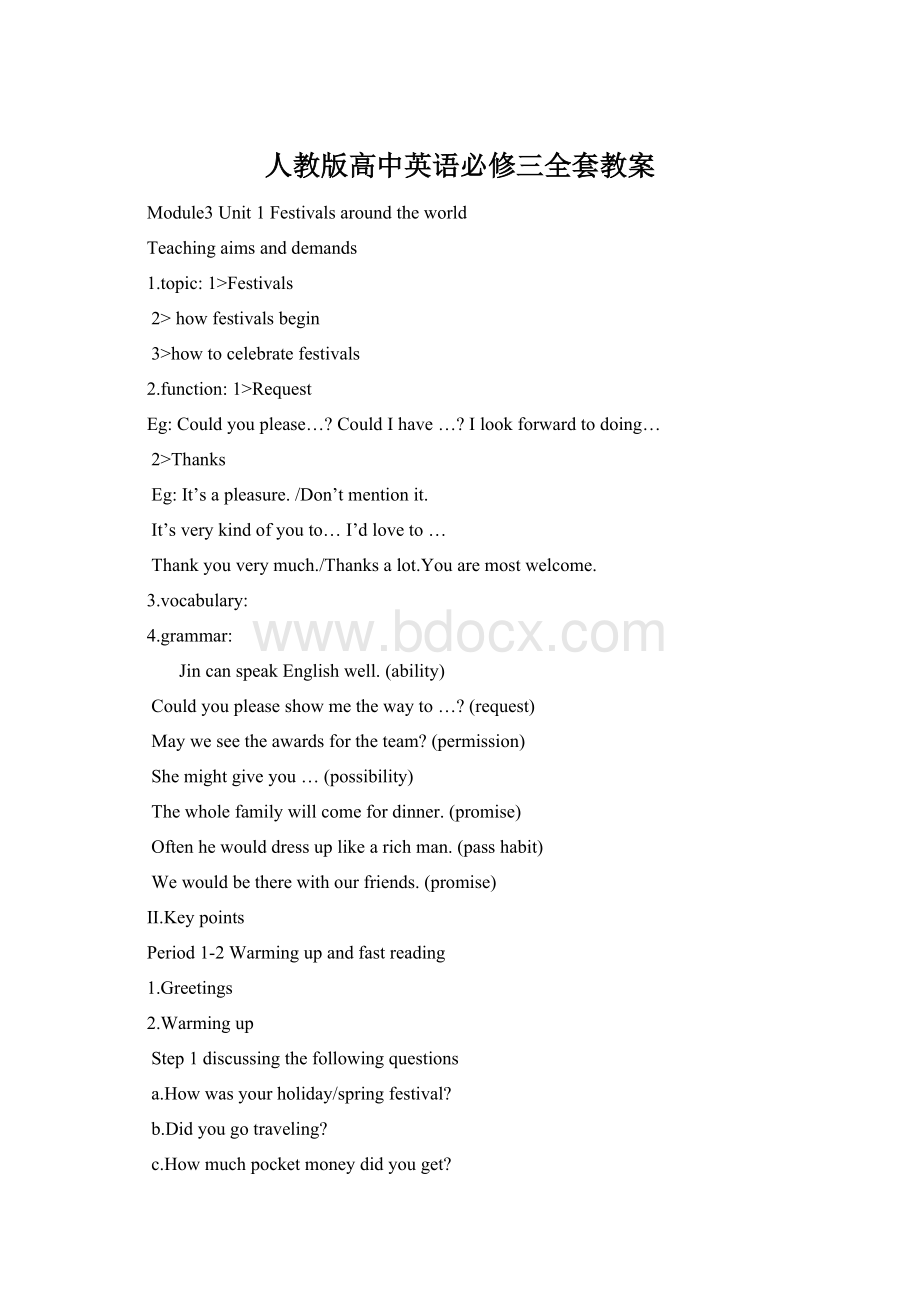人教版高中英语必修三全套教案.docx
《人教版高中英语必修三全套教案.docx》由会员分享,可在线阅读,更多相关《人教版高中英语必修三全套教案.docx(47页珍藏版)》请在冰豆网上搜索。

人教版高中英语必修三全套教案
Module3Unit1Festivalsaroundtheworld
Teachingaimsanddemands
1.topic:
1>Festivals
2>howfestivalsbegin
3>howtocelebratefestivals
2.function:
1>Request
Eg:
Couldyouplease…?
CouldIhave…?
Ilookforwardtodoing…
2>Thanks
Eg:
It’sapleasure./Don’tmentionit.
It’sverykindofyouto…I’dloveto…
Thankyouverymuch./Thanksalot.Youaremostwelcome.
3.vocabulary:
4.grammar:
JincanspeakEnglishwell.(ability)
Couldyoupleaseshowmethewayto…?
(request)
Mayweseetheawardsfortheteam?
(permission)
Shemightgiveyou…(possibility)
Thewholefamilywillcomefordinner.(promise)
Oftenhewoulddressuplikearichman.(passhabit)
Wewouldbetherewithourfriends.(promise)
II.Keypoints
Period1-2Warmingupandfastreading
1.Greetings
2.Warmingup
Step1discussingthefollowingquestions
a.Howwasyourholiday/springfestival?
b.Didyougotraveling?
c.Howmuchpocketmoneydidyouget?
Step2talking
1).Namesomefestivals
SpringFestivalDragonBoatFestivalLantamFestivalMid-AutumnFestival
ArmyDayMayDayTeachers’DayNewYearNationalDayMother’sDay
Children’sDayFather’sDayChristmasDayHalloweencarnival
EasterValentineDayOben
2).SsworkingroupsoffourandlistfiveChinesefestivalsandsiscusswhentheytakeplace,whattheycelevrateandonethingthatpeopledoatthattime.
FestivalsTimeofyear/dateCelebrateforThingstodo
Mid-AutumnDay
SpringFestival
DragonBoatDay
TombsweepingDay
LanternFestival
3.Pre-reading
1)What’syourfavouriteholidayoftheyear?
Why?
2)Whatfestivalsorcelebrationdoyouenjoyinyourcityortown?
Doyoulike
spendingfestivalswithyourfamilyorwithfriends?
Whatpartofafestivaldo
youlikebest—themusic,thethingstosee,thevisitsorthefood?
4.Fastreadingandfindtheanswerstothefollowingquestions.
A.Whatdidancientfestivalscelebrate?
B.Whatarefestivalsofthedeadfor?
C.Whyareautumnfestivalshappyevents?
D.Namethreethingspeopledoatspringfestival?
Period3-4Intensivereading
1.Readthepassageparagraphandfindthemainideasofeachparagraph
Paragraph1:
Allkindsofcelebrationinancienttime.
Paragraph2:
Thepurposetohonourthedeadandthreeexamples
FestivalsTimeThingspeopledo
Oben
DayoftheDead
Halloween
Paragraph3:
ThereasonsWhywehonourpeople
FestivalsWhodoesitcelebrate?
DragonBoatFestivals
ClumbusDay
IndianNationalFestival
Paragraph4:
Autumnfestivalsarehappyevents
Paragraph5:
Howpeoplecelebrateinspringfestivals
2.Languagepoints
a.Theywouldstarveiffoodwasdifficulttofind…
starve(v.)饿死;挨饿
eg.Millionsofpeoplestarvedtodeathduringthewar.
Starveforsth渴望…
Eg.Thehomelesschildrenstarveforlove.
Starvation(n.)饿死
Eg.Dieofstarvation
Starvationwages不够维持基本生活的工资
b.Themostancientfestivalswouldcelebratetheendofthecoldweather,plantinginspringandharvestinautumn.
Celebrate(vt./vi.)庆祝,赞颂,赞美,举行(仪式)
Eg.Wecelebratethenewyearwithaparty.
Theircouragewascelebratedinallthenewspaper.
Celebrated(adj.)=famous著名的,驰名的
c.…becausetheythoughtthesefestivalswouldbringayearofplenty.
days/years/…ofplenty:
富裕(尤指事物和钱)的日子,年月,生活等。
Eg.Youhavealifeofplenty,whatwouldyoubeworriedabout?
d.Somefestivalsareheldtohonourthedead,orsatisfyandpleasetheancestors,whocouldreturneithertohelportodoharm.
1)Honour(v.)“尊敬,给…增光”honoursb.(sth.)withsth.
(n.)“荣誉,光荣,敬意,面子”
Winhonourfor…为…争光Showhonourtosb.尊敬某人
inhonourofsb.(sth.)=insb.’s/sth’shonour出于对某人的敬意
eg.Therewillbeapartyinhonourofhissuccess.
为庆祝他的成功将会举行一个晚会。
Wehaveapartyinhonourofthefamousartist.
为纪念这位著名艺术家我们举办了这场晚会。
2)satisfy(vt.)使满意,令人满意
Eg.Thatanswerwon’tsatisfyher.
那个答案不会使她满意。
Satisfied(adj.)满意的(主语是人)
Satisfactory(adj.)令人满意的(主语是事而不是人)
Satisfying(adj.)令人满意的(主语是事)
Satisfaction(n.)满意
Eg.She’ssatisfiedwithherson’sprogress.
对于儿子的进步她感到很满意。
Doyouthinkwhathesaidissatisfying?
你认为他所见的令人满意吗?
3)harm(n.)(U)伤害
Eg.Don’tbetooserious,hemeantnoharm.
(v.)harmsb./sth.=doharmtosb./sth.
Eg.Don’tbeafraid,thedogwon’tharmyou.
Whatyoudoshoulddomoregoodthanharm.
你所做的应该利大于弊。
e.ThefestivalofHalloweenhaditsoriginasaneventinmemoryof
thedead.
Inmemoryof/tothememoryofsb.最为对某人的纪念,纪念某人
Eg.Themuseumwasbuiltinmemoryofthefamousscientist.
f.Theydressupandtrytofrightenedpeople.
Dressn.连衣裙/v.dresssb./oneself给…穿上衣服
Thefirstthingshedoeseverymorningaftergettingupistodressherson.
她每天起来第一件事就是帮儿子穿衣服。
Dressup盛妆打扮,乔装打扮
Eg.Ladieslovesdressingupmorethananythingelse.
g.Iftheyarenotfivenanything,thechildrenmightplayatrick.
Playatrickonsb.玩弄某人
Eg.Thatnaughtyboylikestoplayatrickonothers.
h.inmemoryofthearrivalofChristopherColumberinAmerica.
Arrivaln.到达
Eg.Wearepleasedfortheirarrival.
i.InIndiathereisanationalfestivalonOctober2tohonorMahatma
Gandhi,theleaderwhohelpedgainIndia’sindependencefromBritan.
Gainn.获得物,收获,增加
Eg.Thebabyhasagainofhalfapound.
v.获得,得到,增加
eg.Hehadgainedhimselfareputationforunfairness.
他是自己得到了一个不公平的名声。
比较:
get得到,获得应用最广的词
Aquire获得,取得指通过漫长的过程而逐渐获得
Gain得到,获得往往指通过努力而获得某种有益或有利的东西
Eg.Igotafavoriteanswer.
Howdidsheacquireherskill?
Ihopeyouwillgainstillgreatersuccess.
j.gather收集,积累
eg.Thepolicehavegatheredinformationaboutthemurderer.
k.…Somepeoplemightwinawardsfortheiranimals…
awardn.奖品,奖金,助学金
winthesecondaward获得第二等奖
wintheawardoftenthousanddolar.
获得一万美元奖金
Vt.奖励,授予awardsb.Sth./sthtosb.
Medalsareawardedtothebestspeakersonthedebatingteam.
奖章授给辩论队中最佳的演说者。
比较:
awardn./vt.对鼓励工作突出所进行的鼓励,往往强调荣誉
Prizen.多指在各类竞赛或抽彩中所赢得的奖。
这种奖有的凭靠能力,有的凭靠运气获得。
Rewardn./v指对某人的工作或服务等的报答。
Eg.Hewontheawardforthebeststudentoftheyear.
Aprizewasgiventothepersonwhohadthewinningnumber.
Thewaitresswasgiventwomoreextradolarforhergoodserves.
l.…whenpeopleadmirethemoonandgivegiftsofmooncakes.
Admirevt.钦慕,羡慕,赞美
Admiresb.forsth.因谋事而赞美/仰慕某人
Admiretodosth.喜欢干谋事
Eg.Don’tforgettoadmirethestudents.
别忘了夸奖学生
Everybodyadmireshimforhisfinesenseofhumour.
人人羡慕他那极好的幽默感。
Ijustadmiretogetletter,butIdon’tadmiretoanswerit.
我只是喜欢收信件,而不喜欢回信。
m.…thatlookingforwardtotheendofwinterandtothecomingofsping.
Lookforwardtodoingsth.
Eg.Iamlookingforwardtoseeingyouagain.
ThechildrenarelookingforwardtovisitingtheGreatWall.
n.Thecountryiscoveredwithcherrytreeflowerssothatitlooksasthough
itmightbecoveredwithpinksnow
asthough=asif引导状语从句,常常放在act,look,sound,feel,smell
等动词后面;引导表语从句常用虚拟语气。
Eg.Hebehavesasthoughnothinghashappened.
Itlooksasifitweresummeralready.
Period5-6Usinglanguage---Reading
Step1.Greetings
Step2.Lead-in:
1.IntroductionofQiqiaoJie
(WhycalledQiqiaoJieandsomecustomsoftheverydayandthesadlovestory.)
2.Thefollowingstoryisamodernsadlovestory.
Step3.Ssreadthequestionsgivenandreadthestorytofindtheanswers.
Step4.wordsandphrases.
1.Butshedidn’tturnup.
Turnup1)出席,来Forseveralreasons,shedidn’tturnup.
2)出现,找到Thebookyouhavelostwillturnuponeday.
3)开大音量(反义词)turndown
Turnuptheradioalittle,Icanhardlyheartheprogram.
2.toholdone’sbreath:
towaitwithoutmuchhope
eg.Thegirlheldherbreathatthesightofthesnake.
3.todrownone’ssadness:
Todrinkinordertoforget
todrownone’ssorrows:
借酒消愁
4.tokeepone’sword守信用(反)tobreakone’sword失信
Eg.Heisamanwhoalwayskeepshisword.
Don’tbelievehim,healwaysbreakshisword.
5.setoff1)动身,出发Tomorrowwe’llsetoffforhome.
2)使…爆炸Thehumanbodybombsetoffamongthecrowd.
6.Idon’twantthemtoremindmeofher.
Remindsb.ofsth.提醒某人某事
Remindsb.todosth.提醒某人做某事
Remindsb.That
Eg.Thepicturesremindmeofmyschooldays.
Remindmetobuyheragift.
Iremindedhimthathemustgohomebeforedark.
7.forgive…for
Eg.Pleaseforgivemeformybeingrude.
Step5.SsworkingroupsoffourtosummarizethestoryandasksomeofThemtotellthestoryintheirownwords.
Period7-8DiscoveringUsefulStuctures:
Modalverbs
1.情态动词的各种语气
1)canandcould
JincanspeakEnglishwell.(ability)
Noonecouldfinishthetestlastweek.(ability)
Theteachersaidthatwecouldnotleaveearly.(permission)
Thehuntersarelost.Theycouldstarve.(possibility)
CouldyoupleaseshowmethewaytoBeihaiPark?
(request)
注意:
表示一般能力时,can可与beableto互换,但表示过去的能力+特定行为时,用was/wereableto,beableto可用于各种时态,而can只能用于现在时。
Eg.Hismotherwasn’tathome,sohewasabletowatchTV
2)mayandmight
Mayweseetheawardsforteams?
(permission,request)
Shemightgiveyousomenewclothing.(possibility)
注意:
1.表示许可时,用于第一人称,指我(们)被允许做某事;由于其他人称,则指说话者允许主语做某事。
Eg.Wemightgoshoppinguntildark.(我们被允许)
Mothersaid:
”Youmightgoshoppinguntildark.”(说话者允许主语做某事)
2.在用于请求许可时,may可与can/could互换
3)willandwould
TheSpringFestivalisthemostfun.Thewholefamilywillcomefordinner.(promise;agreement)
Oftenhewoulddressuplikearichman.(pasthabit;custom)
Wouldyouliketojoinusfordinner?
(request)
注意:
would与usedto均可表示“过去惯常”,但是would常与过去时间状语连用,意为总是,总要;usedto与现在时间相比,意为过去常常,暗示现在已经没有了。
Eg.Whenhewasthere,hewouldgotothatcoffeeshopatthecornerafterworkeveryday?
Heusedtogotothatcoffeeshopatthecornerafterworkeveryday,butnowh